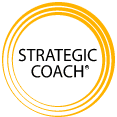What I’m Learning from Strategic Coach

Strategic Coach is a company that has headquarters in Liberty Village, Toronto, and offices in Chicago and the United Kingdom. I first heard of this company through an entrepeneur, and then again when we began to plant a church in Liberty Village.

I’m not the kind of client that they’re looking for. Strategic Coach is designed for high-income entrepreneurs; I’m a church planter. That hasn’t stopped me from ransacking their store to see what resources they have that could benefit me. I’ve learned that they have lots to teach me. I have to filter some of it, but I’m still learning lots.
Here are the top three things I’ve been learning from Strategic Coach:
Learn and focus on what you do best. I’m good at some things, moderately good at some things, and lousy at others. Strategic Coach teaches that our best contribution comes from the essence of who you are and what you’re about, combining your talents, passion, and skills. It’s similar to what Howard Hendricks said:
There are many things in life you “can do” for God. And the more success you have, the more opportunities will come. (You will know more people, you will have more resources, etc.) But most opportunities are distractions in disguise. Therefore find the one thing you “must do” for God.
Strategic Coach offers a book called Unique Ability that I’ve found really helpful in wrestling with and applying this concept. It’s already paying off.
The right question is powerful. Strategic Coach teaches a question (they call it the R-Factor question) that you can use:
If we were meeting three years from today, what has to have happened during that period, both personally and professionally, for you to feel happy about your progress?
Simple, I know, but potentially profound. They also teach a follow-up question to do with dangers, opportunities, and strengths. I’ve found this question really helpful personally and in ministry. It has a way of clarifying one’s thinking and focusing on the future. Their short book, The Dan Sullivan Question, is perhaps not the best named book out there, but it does a good job of explaining how and why to use this question.
Use some days for your most important work, some days free from work, and some days to prepare. Strategic Coach teaches a pretty radical system when it comes to time. They teach that we should divide our time into three different kinds of days:
- Free Days for rejuvenation (150 a year, including weekly days off, vacation, and other holidays)
- Focus Days that are free from non-productive tasks so that you can do your most important work (135 days a year)
- Buffer Days to do the preparation work necessary for you to take Free Days and Focus Days (80 days per year)
They teach that one’s productivity increases dramatically using this system.
150 Free Days sounds pretty radical to me, but taking 4 weeks vacation (28 days) plus stat holidays (12) and a weekly Sabbath (52 days less the 4 already counted under vacation) already brings you to 92. Add another weekend day and you’re almost there.
As I adapt this system, I’m learning the value of taking some days off completely, and taking other days to focus on my most important work. Their book, The Time Breakthrough, explains more about this system.
There’s tons more, but this is a start:
- Learn what your best contribution is, and focus your efforts there.
- Ask good questions that get to the heart of what you’re trying to do.
- Spend some days on your most important work, and some days completely free from work, and some days preparing so that you can do this.
Check them out at StrategicCoach.com.






